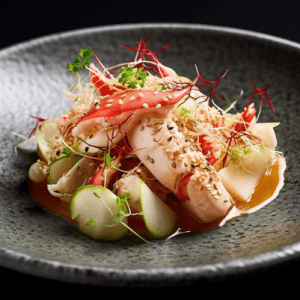Please note that some of the links on this website are affiliate links. I will earn a commission if you decide to make a purchase after clicking through the link. As an Amazon Associate I earn from qualifying purchases.
Nothing beats the thirst-quenching and refreshing taste of watermelon during hot summer days. But this amazing fruit has more to offer than just a cool treat. Watermelons are packed with essential vitamins, minerals, and antioxidants, making them a nourishing addition to your diet.
In this article, we will delve into the history and origin of watermelons, explore their different varieties, and discuss their nutritional value and potential health benefits. We’ll also provide tips on how to choose and store watermelons, and share a collection of delicious recipes that feature this juicy fruit.
Additionally, we’ll highlight the hydrating and skin health benefits of watermelons, and explore their role in weight management and heart health. And to wrap things up, we’ll answer some frequently asked questions about watermelons. So sit back, relax, and let’s explore all there is to know about this beloved fruit.
Watermelon History and Origin
Watermelons have been enjoyed for thousands of years, with evidence of cultivation dating back to ancient Egypt. Over time, watermelons have spread across the globe, finding their way to different regions and gaining popularity for their thirst-quenching and refreshing taste.
The exact origin of the watermelon is hotly debated, with some researchers believing it originated in southern Africa, while others speculate it may have come from the deserts of Namibia. Regardless, it is clear that watermelons were cultivated and widely enjoyed across ancient Egypt, with depictions of the fruit appearing in artwork as early as 4000 BCE.
Early Cultivation
As the popularity of watermelons grew across ancient Egypt, the fruit made its way to other parts of the world. The ancient Greeks and Romans were known to cultivate watermelons, and by the 10th century, the fruit had spread to China. It wasn’t until the 16th century that watermelons were introduced to the Americas, brought over by African slaves during the transatlantic slave trade.
Modern Cultivation
Today, watermelons are cultivated in numerous countries across the world, with China being the world’s largest producer. The United States also produces a significant amount of watermelons, with states like Georgia, Florida, and Texas leading the way. With advancements in technology and farming practices, watermelons continue to be a popular and accessible fruit enjoyed by people of all ages and backgrounds.
Watermelon Varieties
Watermelons come in a variety of shapes, sizes, and colors. The most common type is the traditional round or oblong watermelon with red flesh and black seeds, but there are also seedless varieties that can have white, yellow, or even green flesh. Here are some of the most popular watermelon varieties:
| Variety | Description |
|---|---|
| Seedless | These watermelons have been bred to produce very small, underdeveloped seeds or no seeds at all. They are often larger than traditional watermelons and come in a variety of shapes and colors, including yellow, pink, and red. |
| Yellow-Fleshed | These watermelons have a bright yellow, almost neon flesh. They are typically smaller than traditional watermelons and have a sweeter, less watery flavor. |
| Icebox | These are small, round watermelons that are perfect for small families or for those who don’t need a large watermelon. They typically weigh 5-10 pounds and have a thin rind. |
| Miniature | These watermelons are even smaller than icebox varieties, weighing only 1-2 pounds. They are perfect for individual servings or for snacking on-the-go. |
No matter which variety you choose, make sure to look for a watermelon that is firm, symmetrical, and free of bruises and cuts. And don’t forget to give it a good sniff – a ripe watermelon should have a sweet, slightly floral scent.
Nutritional Value of Watermelon
Watermelon isn’t just a refreshing and thirst-quenching fruit. It’s also packed with essential vitamins, minerals, and antioxidants that contribute to our overall health and wellbeing. Here are some of the key nutrients found in watermelon:
| Nutrient | Amount per 100 grams |
|---|---|
| Water | 92% |
| Carbohydrates | 7.6 grams |
| Fiber | 0.4 grams |
| Protein | 0.6 grams |
| Vitamin C | 10.8 mg |
| Vitamin A | 569 IU |
| Potassium | 112 mg |
| Magnesium | 10 mg |
| Lycopene | 4.5-17.1 mg |
Watermelon is also a good source of other important nutrients, such as vitamin B6, thiamine, and citrulline, an amino acid that helps improve blood flow and reduce muscle soreness after exercise.
Due to its high water content and low calorie count, watermelon is a great snack option for those looking to manage their weight. Additionally, some studies have suggested that the nutrients found in watermelon may help reduce the risk of certain health conditions, such as heart disease and cancer.
It’s important to note that while watermelon has many health benefits, it’s always best to consult a medical professional before making any significant changes to your diet or health routine.
Choosing and Storing Watermelons
Watermelons are a quintessential symbol of summer, and nothing beats biting into a juicy slice on a hot day. However, selecting the perfect watermelon can be tricky, and improper storage can quickly lead to spoiling. Here are some tips to help you choose and store watermelons for maximum freshness and flavor.
How to Choose Watermelon:
When it comes to selecting a watermelon, there are a few key things to look for:
| Tip | What to Look For |
|---|---|
| 1 | Check the field spot. A ripe watermelon should have a creamy yellow or orange spot where it sat on the ground. If it’s white or green, the melon may not be fully ripe. |
| 2 | Tap it. A ripe watermelon should sound hollow when you tap it with your knuckles. |
| 3 | Look for uniform shape and size. Irregularities can indicate uneven ripening or poor growth conditions. |
| 4 | Pick it up. A ripe watermelon should feel heavy for its size, indicating high water content. |
These tips can help you select a sweet, juicy watermelon that’s ready to eat. However, once you’ve picked out your melon, proper storage is crucial to maintaining its flavor and texture.
Storing Watermelon:
Before you cut into your watermelon, it’s important to store it properly. Follow these guidelines to keep your watermelon fresh:
- Store whole watermelons at room temperature until you’re ready to cut them.
- Once you’ve cut into the watermelon, store the remaining pieces in an airtight container in the refrigerator.
- For even better flavor, bring the watermelon to room temperature for 30 minutes before serving.
By following these tips, you can enjoy sweet, juicy watermelons all summer long.
Watermelon Recipes
Watermelons are not only a thirst-quenching summer fruit but also a versatile ingredient that can add a refreshing touch to various dishes. Here are some delicious watermelon recipes to try:
Watermelon Salad
For a simple yet tasty side dish, mix cubed watermelon with feta cheese, fresh mint, and a drizzle of balsamic glaze. Add arugula or mixed greens for extra freshness.
Watermelon Smoothie
To make a refreshing and healthy smoothie, blend frozen watermelon chunks with vanilla yogurt, honey, and lime juice. Top with whipped cream and a sprig of mint.
Watermelon Sorbet
Combine pureed watermelon, sugar, and lemon juice in a saucepan and heat until the sugar dissolves. Chill the mixture before pouring it into an ice cream maker and freezing until firm. Serve with fresh watermelon cubes on top.
Watermelon Gazpacho
This cold soup is perfect for hot summer days. Blend watermelon, cucumber, tomato, red onion, garlic, lime juice, and cilantro in a food processor. Chill in the fridge and serve with croutons and a sprinkle of chili flakes.
Watermelon Margarita
Mix tequila, fresh lime juice, triple sec, and watermelon puree in a shaker with ice. Strain and pour into a salt-rimmed glass filled with ice. Garnish with a lime wedge and a watermelon slice.
Experiment with these watermelon recipes to add a fresh and sweet twist to your summer meals. Enjoy!
Watermelon and Hydration
One of the most significant benefits of watermelons is their ability to quench thirst and hydrate the body. With its high water content, watermelon is a refreshing and delicious way to stay hydrated, especially during the hot summer months.
According to the USDA, watermelon is made up of 92% water, making it an excellent source of hydration. Additionally, it contains essential vitamins and minerals, including vitamin C, potassium, and magnesium, which can help replenish electrolytes lost through sweat.
Watermelon is not only great for hydration but can also help reduce inflammation and oxidative stress, which can contribute to various health issues. The high levels of antioxidants, such as lycopene, in watermelons may help protect against cell damage and lower the risk of chronic diseases.
To get the most benefits from watermelons, it’s recommended to consume them regularly as a part of a balanced diet. Eating watermelon as a midday snack or adding it to smoothies and salads can help keep you hydrated and provide your body with essential nutrients.
Watermelon and Skin Health
Watermelon is a delicious and refreshing fruit that not only satisfies your thirst but may also offer benefits for your skin. Its high water content helps to keep your skin hydrated, while the vitamins and antioxidants in watermelon may contribute to a healthy complexion.
According to a study published in the Journal of Cosmetic Dermatology, the lycopene in watermelon can protect the skin from UV damage and may prevent the development of wrinkles.
In addition, watermelon contains vitamin C, which plays a crucial role in collagen synthesis. Collagen is a protein that gives your skin its structure and elasticity. Vitamin C helps to produce and maintain collagen in your skin, keeping it firm and youthful-looking.
So if you want to keep your skin healthy and radiant, consider incorporating watermelon into your diet. Whether you enjoy it as a snack or use it in recipes, this hydrating fruit may offer a variety of benefits for your skin.
Watermelon and Weight Management
Watermelon is a great option for those looking to manage their weight. With its high water content and low calorie count, it can fill you up without weighing you down. In fact, research has shown that incorporating watermelon into your diet may aid in weight loss efforts.
One cup of diced watermelon contains only 46 calories, making it a smart choice for snacking or as a dessert alternative. It’s also a good source of fiber, which can help you feel fuller for longer periods of time and reduce the urge to overeat.
Watermelon is also a hydrating fruit, which is important for weight management as staying hydrated can help to prevent overeating. When you’re dehydrated, your body can sometimes confuse thirst with hunger, causing you to eat more than you need.
Overall, watermelon can be a great addition to a weight loss or weight management diet due to its low calorie count, high water content, and fiber content which can help to keep you feeling full and satisfied.
Watermelon and Heart Health
Watermelon is not only refreshing, but it may also offer potential benefits for cardiovascular health. Here are some heart-healthy reasons to enjoy this juicy fruit:
- Rich in Lycopene: Watermelon is one of the best sources of lycopene, a powerful antioxidant that may help lower the risk of heart disease by reducing inflammation and oxidative stress.
- May Help Lower Blood Pressure: Some studies suggest that watermelon may have a mild blood pressure-lowering effect, attributed to its high content of citrulline, an amino acid that may improve blood flow and artery health.
- May Help Reduce Cholesterol: Animal studies have shown that watermelon may help reduce blood cholesterol levels, potentially due to its fiber content and compounds such as citrulline and arginine.
While more research is needed to confirm these potential benefits, adding watermelon to your diet is a delicious and nutritious way to support heart health.
Frequently Asked Questions About Watermelons
Watermelons are a popular fruit enjoyed by many people around the world. Here are some common questions and answers to help you learn more about this delicious and refreshing fruit.
Q: How do I know if a watermelon is ripe?
To check if a watermelon is ripe, look for a yellow spot on the bottom where it sat on the ground and tap it to listen for a hollow sound. Additionally, the skin should have a dull appearance and be free from bruises or soft spots.
Q: How should I store my watermelon?
It is best to store a watermelon at room temperature until it is cut. Once cut, it should be wrapped tightly and stored in the refrigerator.
Q: Are seedless watermelons genetically modified?
No, seedless watermelons are not genetically modified. They are a hybrid variety that was developed through cross-pollination to produce fruit without black seeds.
Q: Is it safe to eat the watermelon rind?
Yes, the watermelon rind is safe to eat and can be used in recipes like pickles or stir-fries. However, it may have a bitter taste and tough texture, so it is recommended to remove the outer green layer and just utilize the white part.
Q: Can you eat too much watermelon?
While watermelon is generally considered safe to eat, consuming excessive amounts can lead to digestive discomfort due to its high water content. It is recommended to eat watermelon in moderation as part of a balanced diet.
Q: What are some creative ways to use watermelon in recipes?
Watermelon can be used in a variety of recipes, from salads and salsas to smoothies and sorbets. Some creative ideas include watermelon feta skewers, watermelon gazpacho, and watermelon margaritas.
Q: Is watermelon a good source of nutrients?
Yes, watermelon is a good source of vitamins A and C, as well as potassium and antioxidants like lycopene. It is also low in calories and high in water content, making it a great choice for hydration and weight management.











